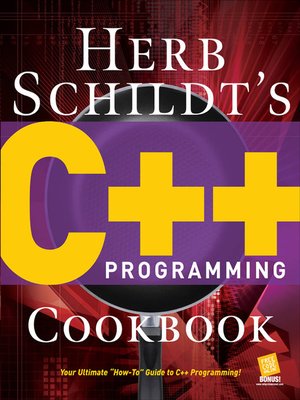
Sign up to save your library
With an OverDrive account, you can save your favorite libraries for at-a-glance information about availability. Find out more about OverDrive accounts.
Find this title in Libby, the library reading app by OverDrive.



Search for a digital library with this title
Title found at these libraries:
| Library Name | Distance |
|---|---|
| Loading... |
Your Ultimate "How-To" Guide to C++ Programming!
Legendary programming author Herb Schildt shares some of his favorite programming techniques in this high-powered C++ "cookbook." Organized for quick reference, each "recipe" shows how to accomplish a practical programming task. A recipe begins with a list of key ingredients (classes, functions, and headers) followed by step-by-step instructions that show how to assemble them into a complete solution. Detailed discussions explain the how and why behind each step, and a full code example puts the recipe into action. Each recipe ends with a list of options and alternatives that suggest ways to adapt the technique to fit a variety of situations. Whether you're a beginner or an experienced pro, you'll find recipes that are sure to satisfy your C++ programming appetite!
Topics include:
String Handling · Standard Template Library (STL) Containers · Algorithms · Function Objects · Binders · Negators · Adaptors · Iterators · I/O · Formatting Data
Learn how to:







